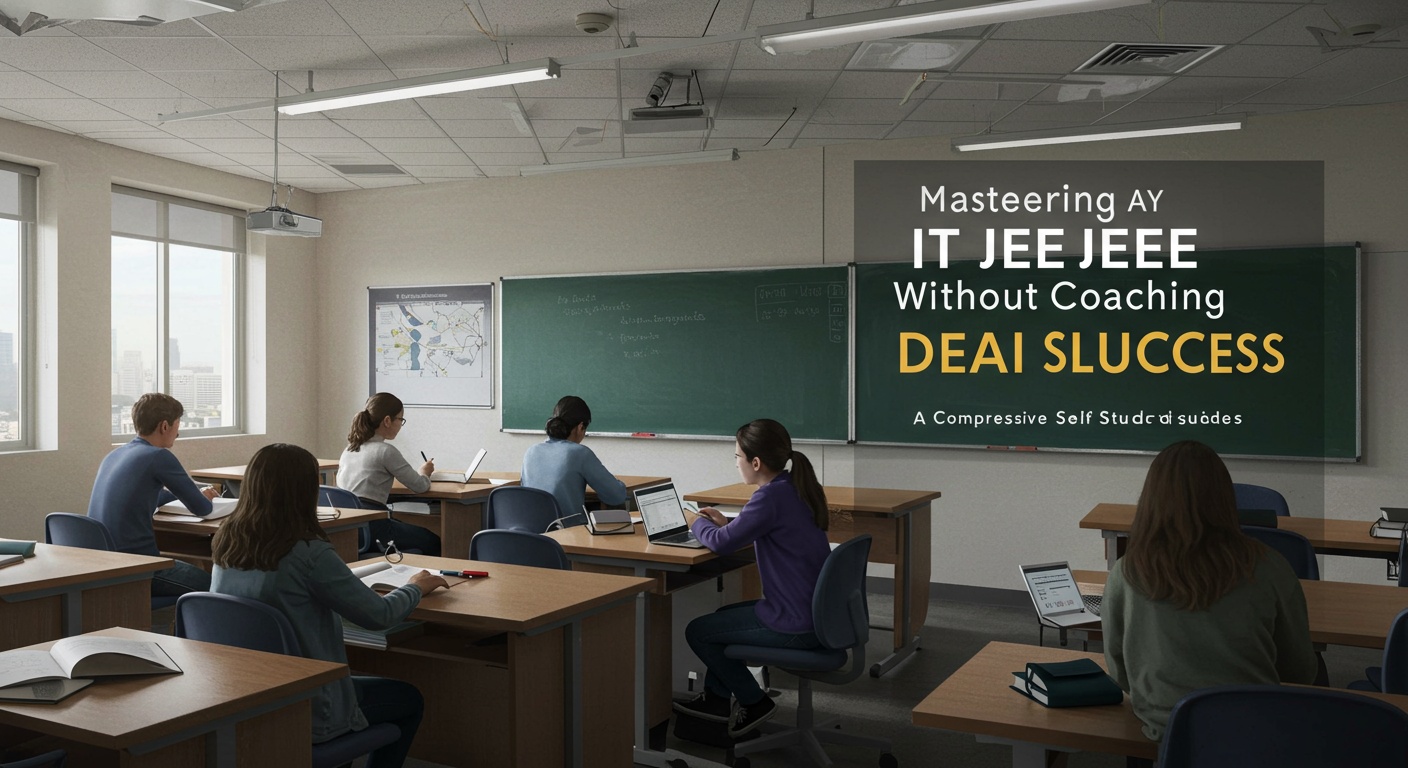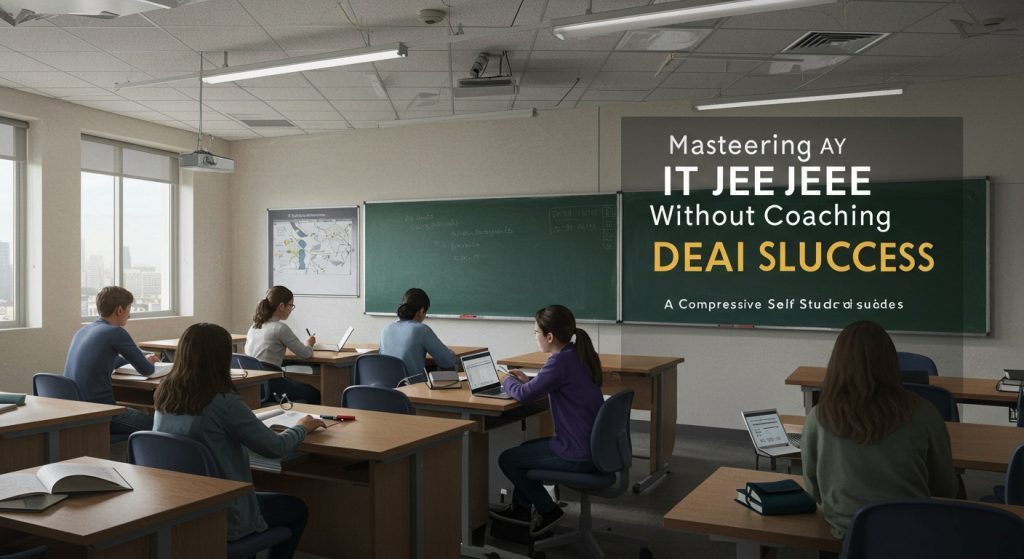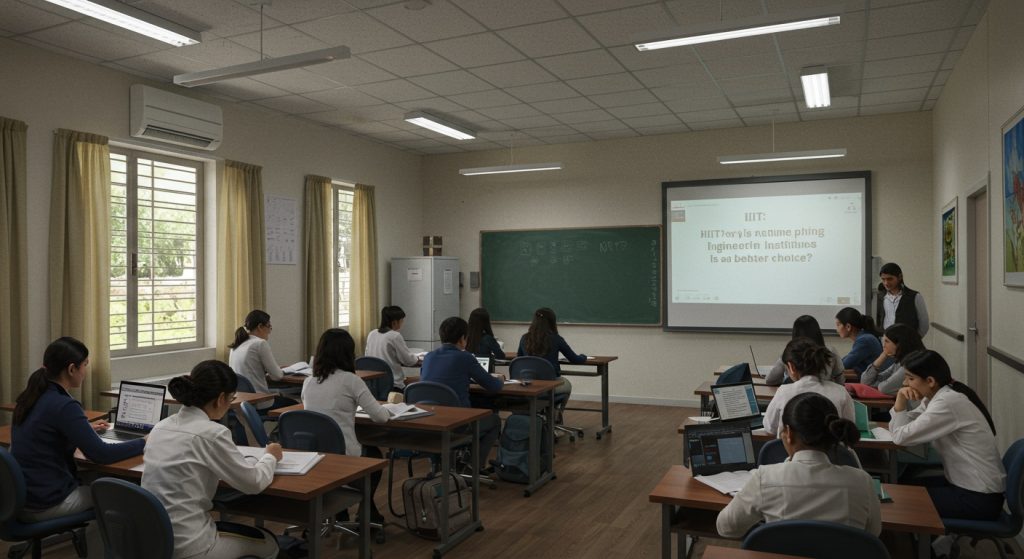The pursuit of an IIT seat often conjures images of bustling coaching centers, yet a growing number of aspirants are rewriting this narrative. The digital age, with its vast repositories of open educational resources like NPTEL lectures and extensive problem banks, empowers dedicated individuals to master the rigorous IIT JEE syllabus independently. Success hinges not on institutional affiliation. On cultivating a robust self-study regimen: dissecting complex topics like electrodynamics or organic reaction mechanisms, rigorously solving past year papers. Meticulously analyzing performance. This disciplined, personalized approach fosters a profound conceptual understanding, proving that strategic self-reliance is not just possible but often superior for navigating the exam’s evolving challenges and achieving top ranks.

Understanding the IIT JEE Landscape
The Indian Institutes of Technology Joint Entrance Examination (IIT JEE) is one of the most challenging and competitive engineering entrance examinations globally. It serves as the gateway to the prestigious Indian Institutes of Technology (IITs), which are renowned for their world-class engineering education and research. Every year, millions of aspiring engineers vie for a limited number of seats in these premier institutions. The exam is conducted in two stages: JEE Main, which qualifies students for various NITs, IIITs. Other central technical institutions. Also for JEE Advanced, the exclusive test for admission to the undergraduate programs at the Top IITs. Understanding the nature of this exam, its vast syllabus. The intensity of the competition is the first crucial step for any aspirant, especially those choosing the self-study path.
Why Choose Self-Study for IIT JEE?
While coaching institutes have become a popular choice for JEE preparation, self-study offers a unique set of advantages that can be incredibly powerful for the right individual. It’s not merely about saving coaching fees; it’s about fostering independence, deep understanding. Personalized learning.
- Personalized Learning Pace
- Cost-Effectiveness
- Flexibility and Autonomy
- Deep Conceptual Understanding
- Enhanced Problem-Solving Skills
Self-study allows you to spend more time on challenging topics and quickly move past those you’ve mastered. There’s no pressure to keep up with a class or wait for others.
Coaching fees can be exorbitant, placing a significant financial burden on families. Self-study makes quality education accessible to everyone, regardless of their economic background.
You decide your study schedule, breaks. Learning environment. This flexibility is crucial for maintaining balance and preventing burnout.
Without the “spoon-feeding” often associated with some coaching models, self-learners are compelled to grapple with concepts independently, leading to a more profound and lasting understanding.
When you’re solely responsible for finding solutions and clearing doubts, you develop superior research and analytical skills, which are invaluable not just for JEE but for life.
It’s essential to dispel the myth that coaching is indispensable. Many successful candidates, including those who made it to the Top IITs, have relied primarily on self-study. Their success stories underscore that discipline, strategy. Consistent effort outweigh reliance on external institutions.
| Feature | Self-Study | Traditional Coaching |
|---|---|---|
| Pace of Learning | Completely flexible, tailored to individual needs. | Fixed pace, class-driven; may be too fast or slow. |
| Cost | Minimal (books, internet, mock tests). | High (tuition fees, study materials, transport). |
| Doubt Resolution | Self-research, online forums, peer groups, teachers at school. | Dedicated doubt sessions, direct access to teachers. |
| Discipline Required | Extremely high self-discipline and motivation. | External structure provides some discipline. |
| Resource Selection | Requires careful research and selection of books/online platforms. | Materials often provided by the institute. |
| Environment | Quiet, personalized home environment. | Competitive classroom environment. |
The Foundation: Deconstructing the Syllabus and Curating Resources
The JEE syllabus is vast, encompassing Physics, Chemistry. Mathematics from classes 11 and 12. Success in self-study hinges on a meticulous understanding of this syllabus and choosing the right study materials.
Understanding the Syllabus
The first step is to download the official JEE Main and JEE Advanced syllabi from their respective NTA and IIT websites.
- Categorize Topics
- Weightage Analysis
- Interconnectedness
Divide the syllabus into easy, medium. Difficult topics based on your current understanding.
review previous years’ papers to comprehend the weightage of different topics. This helps in prioritizing your study. For instance, in Physics, Mechanics and Electrostatics often carry significant weight. In Chemistry, Organic Chemistry and Physical Chemistry are crucial. For Mathematics, Calculus and Algebra are foundational.
Identify how topics are interconnected. For example, understanding vectors is crucial for many topics in Physics.
Curating Your Study Arsenal
Choosing the right books is paramount. Avoid the temptation to accumulate too many; quality over quantity is key.
- NCERT Textbooks
- Standard Reference Books
- Physics
- Chemistry
- Mathematics
- Previous Year Question Papers (PYQs)
- Online Resources
These are non-negotiable. For Chemistry, NCERT books are often sufficient even for JEE Advanced, especially for Inorganic Chemistry. For Physics and Mathematics, they lay a strong foundation. A significant portion of JEE Main questions are directly based on NCERT concepts.
H. C. Verma (Concepts of Physics) for conceptual clarity and problem-solving. D. C. Pandey for a wider range of problems.
O. P. Tandon (Physical), M. S. Chauhan (Organic), V. K. Jaiswal (Inorganic) are widely recommended for comprehensive practice and theory.
S. L. Loney (Coordinate Geometry, Trigonometry), Arihant Publications (various authors like G. Tewani, V. Kumar for specific topics like Calculus, Algebra), or R. D. Sharma for extensive practice.
These are goldmines. Solve JEE Main and Advanced papers from at least the last 10-15 years. They reveal exam patterns, vital topics. Question types.
Platforms like Khan Academy, Byju’s, Unacademy. Various YouTube channels offer free conceptual videos. Websites like Vedantu, Embibe. Others provide practice questions and mock tests. For doubt resolution, platforms like StackExchange (for specific technical doubts) or dedicated JEE forums can be immensely helpful.
Crafting Your Personalized Study Plan
A structured study plan is your roadmap to success. It should be realistic, flexible. Tailored to your strengths and weaknesses.
Phase-wise Planning
Phase 1: Foundation Building (Months 1-6)
- Focus: NCERT mastery, fundamental concepts in all subjects. - Strategy: Read theory, solve NCERT exercises, then move to basic problems from reference books. - Goal: Solidify understanding of Class 11 topics. Phase 2: Advanced Concept & Problem Solving (Months 7-12)
- Focus: Class 12 syllabus, advanced concepts, deeper problem-solving. - Strategy: Integrate Class 11 revision with Class 12 new topics. Tackle harder problems from reference books. - Goal: Complete syllabus, achieve conceptual depth. Phase 3: Revision & Mock Tests (Months 13-18/24)
- Focus: Comprehensive revision, mock tests, error analysis, speed and accuracy. - Strategy: Daily revision of all subjects, topic-wise and full-syllabus mock tests. - Goal: Optimize performance for the actual exam. Daily and Weekly Scheduling
A typical day should balance all three subjects. A common approach is 3-4 hours per subject, interspersed with breaks.
- Morning (4-5 hours)
- Afternoon (3-4 hours)
- Evening (2-3 hours)
- Breaks
- Weekly Review
- Flexibility
Tackle the most challenging subject or new concepts when your mind is fresh.
Practice problems, solve exercises.
Review, revise. Clear doubts.
Incorporate short breaks (10-15 minutes) every 1-2 hours and a longer break (30-60 minutes) in the afternoon.
Dedicate a few hours every weekend to review topics covered during the week and plan for the next.
Life happens. If you miss a day, don’t fret. Adjust your schedule. Ensure you catch up.
Use a planner or a digital calendar to map out your daily and weekly goals. Be specific, e. G. , “Physics: Solve 20 problems from Rotational Motion, HC Verma.”
Mastering Concepts and Problem Solving
Rote learning won’t work for JEE. The exam tests your application of concepts.
Conceptual Clarity
- Active Reading
- Feynman Technique
- Derivations and Proofs
- Mind Maps and Flowcharts
Don’t just read passively. Highlight, make notes, draw diagrams.
A powerful learning method. When you study a concept, try to explain it in simple terms to an imaginary student. If you struggle, it means you haven’t understood it fully.
comprehend the derivations of formulas, especially in Physics and Mathematics. This helps in remembering them and applying them in diverse scenarios.
Visual aids can help organize complex insights and show relationships between concepts.
Effective Problem Solving
Solving problems is the core of JEE preparation.
- Start Simple
- Gradual Difficulty
- Previous Year Questions (PYQs)
- Error Analysis
- Time Management per Problem
Begin with basic, direct application problems after studying a concept.
Progress to moderate and then challenging problems. Don’t jump to the toughest ones immediately.
Integrate PYQs from day one. Interpret why a particular solution works and why others don’t.
Maintain an “Error Log.” Whenever you make a mistake, note down the question, your incorrect approach, the correct approach. The conceptual gap that led to the error. Regularly revisit this log. This is a critical habit for self-learners.
As you practice, try to solve problems within a time limit (e. G. , 2-3 minutes per problem for JEE Main, 3-5 minutes for JEE Advanced).
Sample Error Log Entry: Date: 2023-10-27
Subject: Physics
Topic: Rotational Motion - Torque
Question: A force F = (2i + 3j - k) N acts at a point P (1, -1, 2) m. Find the torque about the origin. My Approach: Calculated r x F directly without realizing the position vector r is (P - O). Correct Approach: Torque τ = r x F, where r is the position vector of the point where the force acts relative to the point about which torque is calculated. Here, r = (1i - 1j + 2k). Then perform the cross product. Conceptual Gap: Misunderstanding of the position vector in torque calculation. Need to review "Moment of a Force." Action Item: Re-read Torque section from HC Verma, solve 5 more problems involving cross product for torque. Mock Tests and Analysis: The Feedback Loop
Mock tests are your most valuable tool for self-assessment. They simulate the actual exam environment and reveal your strengths and weaknesses.
The Importance of Mock Tests
- Real Exam Simulation
- Time Management Practice
- Identify Weak Areas
- Build Stamina
They help you get accustomed to the exam pattern, time constraints. Pressure.
You learn to allocate time effectively among sections and questions.
Performance in mock tests highlights topics where you need more practice.
JEE Advanced is a 6-hour exam (two papers of 3 hours each). Mock tests help build the mental and physical stamina required.
Effective Mock Test Strategy
- Regularity
- Simulate Conditions
- Post-Test Analysis
- Review every question, not just the incorrect ones.
- Identify questions you got wrong due to conceptual errors, silly mistakes, or lack of time.
- assess questions you got right but took too long to solve.
- Categorize mistakes by subject and topic. This informs your revision plan.
- For example, if you consistently make errors in thermodynamics, dedicate extra time to that chapter.
- Iterate and Improve
Start taking full-syllabus mock tests at least once every two weeks initially, increasing to once a week or even twice a week closer to the exam.
Take the test at the same time as the actual JEE, in a quiet environment, without distractions. Use an OMR sheet if applicable for JEE Main, or online platforms for JEE Advanced simulation.
This is the most crucial step. Don’t just look at your score.
Use the analysis to refine your study plan. Focus on improving accuracy and speed in your weak areas.
Mindset, Motivation. Well-being
The JEE journey is a marathon, not a sprint. Maintaining a positive mindset and taking care of your well-being are as essential as academic preparation.
Cultivating a Winning Mindset
- Believe in Yourself
- Stay Positive
- Process-Oriented
- Inspiration
Self-study requires immense self-belief. Grasp that success is a product of consistent effort and smart strategy, not just innate talent or coaching.
There will be bad days, low scores in mock tests. Moments of doubt. Acknowledge them. Don’t let them derail you. Learn from failures.
Focus on the daily effort, the learning process. Small improvements, rather than solely on the final outcome.
Read success stories of self-taught individuals, watch motivational talks, or connect with peers who share your goals.
Maintaining Motivation and Avoiding Burnout
- Set Small Goals
- Reward Yourself
- Balanced Lifestyle
- Hobbies and Breaks
- Connect with Peers
Break down your large goal (cracking JEE) into smaller, achievable daily or weekly targets. Ticking them off provides a sense of accomplishment.
After achieving a mini-goal, give yourself a small, healthy reward (e. G. , watch an episode of your favorite show, listen to music, go for a walk).
Don’t neglect sleep, nutrition. Physical activity. A healthy body supports a healthy mind. Aim for 7-8 hours of sleep.
Dedicate time for hobbies or activities you enjoy. This provides a mental break and prevents monotony. Rohan, a self-studying JEE aspirant who secured a seat in one of the Top IITs, often credits his daily 30-minute meditation and evening walk for keeping him sane and focused during his rigorous preparation.
Form a small study group with like-minded friends. Discuss doubts, challenge each other. Offer mutual support. This can mimic the collaborative aspect of coaching without the rigid structure.
Common Pitfalls and How to Avoid Them
Self-study has its unique challenges. Being aware of them can help you navigate the journey more smoothly.
- Lack of Discipline
- Solution
- Doubt Accumulation
- Solution
- Procrastination
- Solution
- Over-reliance on Online Solutions
- Solution
- Neglecting Revision
- Solution
- Burnout and Isolation
- Solution
The biggest hurdle.
Create a strict timetable and stick to it. Use accountability partners (friends, family) or apps that track study time.
Without immediate teacher access, doubts can pile up.
Utilize online forums (e. G. , Quora, Reddit communities for JEE), official solution manuals, peer groups, or even school teachers. Make a dedicated “doubt list” and resolve them regularly.
Easy to put off difficult topics or practice.
Break down daunting tasks into smaller, manageable chunks. Use techniques like the Pomodoro method (25 mins study, 5 mins break).
Temptation to directly look up answers instead of genuinely trying to solve.
Only refer to solutions after making a sincere attempt (at least 15-20 minutes on a tough problem). Grasp the logic, don’t just copy.
Without a structured revision plan, concepts can fade.
Implement spaced repetition. Regularly revisit older topics. Utilize your error log effectively.
The solitary nature of self-study can lead to mental fatigue.
Maintain a social life, engage in hobbies. Ensure sufficient rest and physical activity. Remember Priya, who balanced her JEE prep with learning to play the guitar. She found that the creative outlet helped her brain refresh and approach studies with renewed vigor.
Leveraging Online Resources for Self-Study
The digital age has democratized education, making self-study for exams like JEE more viable than ever before.
- Video Lectures
- Online Test Series
- Interactive Learning Platforms
- Discussion Forums & Communities
- Digital Textbooks & PDFs
Platforms like YouTube are treasure troves of high-quality lectures from experienced educators. Channels like “Physics Wallah,” “Vedantu JEE,” “Unacademy JEE” offer comprehensive coverage of topics. This is an excellent substitute for classroom teaching.
Numerous platforms (e. G. , FIITJEE, Aakash, Resonance, Allen provide online test series for a fee, which can be invaluable for practice and benchmarking your performance against a larger pool of students. Many platforms also offer free mock tests.
Websites like Byju’s, Toppr, or Embibe offer interactive lessons, practice questions with detailed solutions. Personalized analytics to track your progress.
Websites like Quora, Reddit (r/JEENEETards), or dedicated Telegram/Discord groups can be excellent for clarifying doubts, sharing resources. Staying motivated with peers. Always verify insights from multiple sources.
Many standard textbooks are available in digital format, making them accessible and portable.
Consider the case of “Aman,” a student from a remote area with limited access to quality coaching. He relied heavily on YouTube lectures for conceptual clarity, free online mock tests for practice. A JEE discussion forum for doubt resolution. He meticulously maintained an error log based on his online test performance and managed to secure a commendable rank, proving that geographical barriers can be overcome with smart use of digital tools.
Conclusion
Mastering IIT JEE without coaching isn’t just about financial savings; it’s a profound journey of self-discovery and discipline. Remember to actively engage with your material, applying techniques like spaced repetition for concepts and immediate problem-solving after grasping a new topic – don’t just passively consume video lectures. For instance, after learning about rotational dynamics, tackle 10 diverse problems from your textbook or an online question bank like the NTA Abhyas app, analyzing every mistake. My personal experience revealed that consistency, even just dedicating 30 minutes daily to a weak area, yields far greater returns than sporadic long hours. The JEE landscape is dynamic, with recent shifts emphasizing analytical thinking over rote memorization. Embrace this challenge, for the self-reliance you cultivate now will be your greatest asset, not just for IIT. Throughout your engineering career. Believe in your unique path; your dedication is your most powerful coach.
More Articles
Top Engineering Universities in France: A Comprehensive Guide for 2025
Best UK Universities For Artificial Intelligence Research In 2025
Funding Your Postgraduate Studies in the UK: A Comprehensive Guide
International Students: Application Checklist for Top UK Universities
FAQs
Can I really crack IIT JEE without joining a coaching center?
Absolutely! While coaching centers offer structure, this guide is specifically designed to provide that same level of comprehensive planning, strategy. Resource recommendations, empowering dedicated students to achieve top ranks through self-study. It’s all about discipline and smart preparation.
What kind of commitment and discipline does this self-study approach demand?
Self-studying for IIT JEE requires a high level of self-discipline, consistency. Proactive learning. You’ll need to be committed to creating and sticking to your study schedule, identifying your weak areas. Actively seeking solutions to doubts. It’s a marathon, not a sprint. Your dedication is key.
How do I pick the right study materials and resources if I’m not in a coaching class?
The guide offers detailed advice on selecting the most effective textbooks, online resources. Practice papers. It emphasizes quality over quantity, focusing on standard books, reliable online platforms. A strategic approach to past year questions to ensure you cover all necessary concepts thoroughly.
Got any tips for managing my time well when studying on my own?
Time management is crucial! The guide provides frameworks for creating a realistic daily and weekly study schedule, incorporating breaks, revision slots. Dedicated time for problem-solving. It also covers techniques like the Pomodoro method and prioritizing topics based on their weightage and your strengths.
What if I get stuck on a tough concept and don’t have a teacher to ask immediately?
Doubt clearing is addressed by recommending various strategies. These include utilizing online forums, educational apps, peer study groups. Cross-referencing multiple reliable sources. The guide also encourages developing a problem-solving mindset where you break down complex problems and explore different approaches.
How do I stay motivated and avoid burnout during such a long preparation period?
Maintaining motivation is vital. The guide suggests setting small, achievable goals, tracking your progress, taking regular short breaks. Ensuring you get enough rest. It also highlights the importance of celebrating milestones, staying connected with a supportive network. Remembering your ultimate goal to keep you going.
How crucial are mock tests and solving previous year papers in this self-study plan?
Mock tests and past papers are absolutely indispensable! They are your best tools for self-assessment, time management practice, identifying weak areas. Getting familiar with the exam pattern and question types. The guide provides a structured approach to integrating them into your preparation, ensuring you learn from every test.



